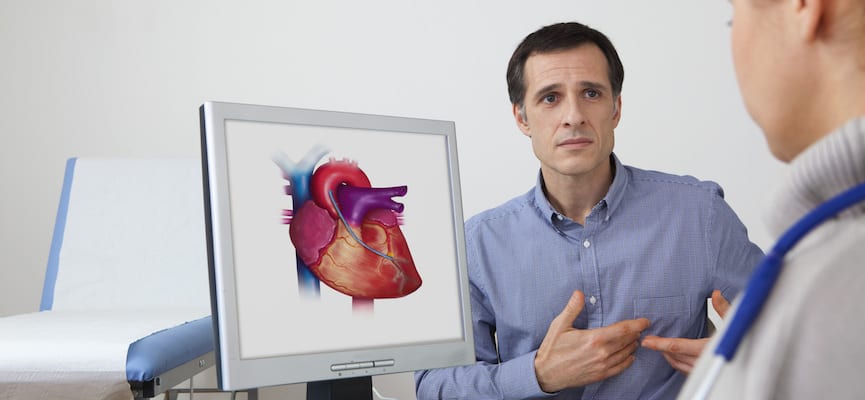Coronary Heart Disease - Causes, Symptoms and Treatment
Coronary Heart Most Deadly DiseasesCoronary heart disease caused by a buildup of cholesterol, fat, or other substances in the blood vessel wall.The heart is a vital organ blood flow in the center of the body.As people age, the elasticity of blood vessels decreased, accompanied by free radicals and fatty plaques that can perch on the wall of blood vessels.Coronary heart disease is medically referred to as ischemic heart disease.This disease is one cause of death in Indonesia.Approximately 35% of the Indonesian population mortality due to heart disease.According to the World Heart Federation, the death rate from coronary heart disease in Southeast Asia reached 1.8 million cases in 2014.

Causes
Coronary heart disease occurs when the coronary arteries (the arteries that supply blood to the heart muscle) become hardened and narrowed.This is due to the buildup of cholesterol and other substances, called plaque, on the walls of blood vessels.This buildup is called atherosclerosis.Plaques will be even greater so that blood flow to the heart muscle is getting fewer and more difficult.As a result, the heart muscle can not get the blood or oxygen it needs.When the network is less intake, then it will be responded cell as what we know as "typical chest pain" called "angina", or if the total clogged coronary artery, the patient can fall into a state of "heart attack".A heart attack is what is the medical urgency due cause permanent heart damage or even death.
Coronary heart disease occurs when the coronary arteries (the arteries that supply blood to the heart muscle) become hardened and narrowed.This is due to the buildup of cholesterol and other substances, called plaque, on the walls of blood vessels.This buildup is called atherosclerosis.Plaques will be even greater so that blood flow to the heart muscle is getting fewer and more difficult.As a result, the heart muscle can not get the blood or oxygen it needs.When the network is less intake, then it will be responded cell as what we know as "typical chest pain" called "angina", or if the total clogged coronary artery, the patient can fall into a state of "heart attack".A heart attack is what is the medical urgency due cause permanent heart damage or even death.
Symptoms
If plaque is not interfere with blood flow, or no tear plaque, then there is not necessarily symptoms caused.However, if the plaque is quite large, then the symptoms caused are as follows:
If plaque is not interfere with blood flow, or no tear plaque, then there is not necessarily symptoms caused.However, if the plaque is quite large, then the symptoms caused are as follows:
- Chest pain or discomfort in the chest, pain may spread to the neck, jaw, shoulder, and the left-hand side, back, left side of the abdomen (often considered to be an ulcer).This pain can be mild to severe.Chest pain is referred to as "angina".Angina can last for several minutes.If plaque is not clogged coronary arteries in total, then the wind will subside by itself.If angina persist continuously, then immediately take you to the doctor.
- Cold sweat, nausea, vomiting, or fatigue.
- Rhythm steady heartbeat (arrhythmia) can even cause cardiac arrest (sudden cardiac arrest) which if not treated quickly can lead to death
Prevention
Fortunately, there are many things you can do reduce your chances of getting heart disease.You must do the following:
- Know your blood pressure regularly and keep blood pressure in normal numbers (<130/90 mmHg)
- exercise regularly
- do not smoke
- Control blood sugar levels
- Control up cholesterol from triglyceride
- Eating lots of fruits and vegetables
- Maintain a healthy weight
- Avoid excess stress
Heart Healthy Foods for
Your doctor may recommend a heart-healthy eating, which should include:
Your doctor may recommend a heart-healthy eating, which should include:
- Fat-free dairy products or low-fat
- Fish high in omega-3 fatty acids, such as salmon or tuna, about twice a week
- Fruits, such as apples, bananas, oranges, pears, plums and
- Legumes, such as beans, lentils, beans, peas, and lima beans
- Vegetables, such as broccoli, cabbage, and carrots
- Grains, such as oatmeal, brown rice, and corn tortillas
The food was obliged to avoid:
- Red meat
- Fried foods both vegetable and animal oils
- Food and sugary drinks
Management of
Arrhythmias and cardiac arrest is due to gravity, then the case is handled in the ER.As an initial management of patients will be given oxygen, aspilet as blood thinners, morphine as antinyeri (due to blockage that caused it was very painful angina), nitroglycerin sublingual (placed under the tongue) to relieve symptoms.For definitive therapy (therapy that go directly to the root of the problem), could be in 2 ways: operative by placing a ring, or with medications r-TPA (Tissue plasminogen activator), which is a protein to destroy the blood clot that sticks to the walls of blood vessels and only given once in a lifetime.
Arrhythmias and cardiac arrest is due to gravity, then the case is handled in the ER.As an initial management of patients will be given oxygen, aspilet as blood thinners, morphine as antinyeri (due to blockage that caused it was very painful angina), nitroglycerin sublingual (placed under the tongue) to relieve symptoms.For definitive therapy (therapy that go directly to the root of the problem), could be in 2 ways: operative by placing a ring, or with medications r-TPA (Tissue plasminogen activator), which is a protein to destroy the blood clot that sticks to the walls of blood vessels and only given once in a lifetime.
In patients with coronary heart disease, after treatment in the ED has provided stability in patients, the drug must be consumed as an outpatient drug is nitroglycerin sublingual drug and drug aspilet.(Dr. Ursula Penny)


Untuk menyisipkan kode pendek, gunakan <i rel="code"> ... KODE ... </i>
Untuk menyisipkan kode panjang, gunakan <i rel="pre"> ... KODE ... </i>
Untuk menyisipkan gambar, gunakan <i rel="image"> ... URL GAMBAR ... </i>